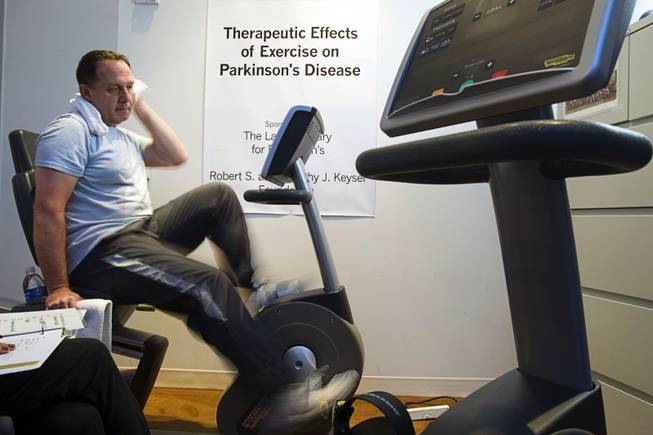
Dean Bengert rides a stationary bicycle at the Cleveland Clinic Lou Ruvo Center for Brain Health Monday, February 6, 2012. Bengert, 52, is participating in a clinical trial that is studying the effect of exercise on patients with Parkinson’s disease.
Wednesday, Feb. 15, 2012 | 2 a.m.
Related stories
- Fighters embrace Ruvo Center project that tackles head trauma (2-15-2012)
- Volunteering at the Ruvo Center: How to lend a hand — and a heart (2-14-2012)
- Lou Ruvo Center's world-class services are for locals, too (2-14-2012)
- Ruvo Center trial putting Parkinson’s patients on bikes (6-02-2010)
- Ruvo Center begins treating patients (7-17-2009)
- Brain institute’s first patient ‘the end of the beginning’ (6-14-2009)
- In Cleveland, patients are priority (2-17-2009)
- Ruvo’s mission is bold, driven by love (2-17-2009)
- Ruvo’s dream becomes real (2-17-2009)
- Aiming to revolutionize dementia research (1-7-2009)
- Brain institute thinking big (12-24-2008)
- Six-figure donation to be used to fight brain diseased (1-28-2008)
- Where I Stand — Guest columnist Larry Ruvo: Defeating Alzheimer’s (8-26-2005)
In just a few years, the Cleveland Clinic Lou Ruvo Center for Brain Health has become one of the nation’s leading facilities for the research and treatment of neurodegenerative disorders, and the Las Vegas-based clinic is showing no signs of slowing down.
In the past year, the center, which serves as the command center of a national research network that includes Cleveland Clinic campuses in Cleveland; Lakewood, Ohio; and Florida, has more than tripled the number of clinical trials being conducted, with 20 under way. The number of patients enrolled in clinical trials has risen from 33 in January 2011 to 245 in January 2012.
The main focus is on developing early identification tests and possible treatments for Alzheimer’s disease, but the research also extends into other neurodegenerative and neuromuscular diseases, such as multiple sclerosis, Parkinson’s disease and Huntington’s disease.
Many of the trials are exploring treatments and diagnostic tests that have never been studied in the United States.
“The speed of the growth is very fast and very significant,” said Dr. Kate Zhong, senior director of clinical research development at the center. “Clinical trials are the only way to bring new treatments to patients. All drugs on the market must go through clinical trials first.”
Here’s a look at some of the areas of medical research the Ruvo Center is working to advance:
Immunotherapy
In perhaps the most promising area of research, the center is seeking new solutions to treat the root causes of Alzheimer’s through a vaccine, as opposed to treating the symptoms, like currently available commercial drugs do.
“The concept of the vaccine is giving the antibodies that will remove toxic proteins from the patient’s brain,” Zhong said.
Four trials are exploring immunotherapy treatments in a range of patients, from those showing hardly any symptoms to those with mild to moderate progressions of Alzheimer’s, she said.
“Our goal is to have a range of treatment options,” including oral tablets and intravenous vaccines, Zhong said. “These could change the course of the disease and have a fundamental impact on the outcome.”
Preliminary results from one trial are expected by the end of 2012, with more definitive results emerging in 2013. But it could still take years before a vaccine is commercially available, Zhong said, because of the strict testing and documentation required by the Food and Drug Administration.
Diagnostic tests
Early diagnoses of Alzheimer’s generally result in more treatment options and better long-term outcomes for patients. But current medical technology makes catching the disease in its initial stages difficult, Zhong said, and often the diagnosis is made by a physician based on the symptoms displayed by a patient.
“There’s tremendous variability from doctor to doctor ... and that can lead to a long delay between the first onset (of the disease) and when the patient is diagnosed,” she said.
The Ruvo Center is researching a new blood test that would use biomarkers to provide an earlier and more accurate way of identifying the disease. If successful, the test could be easily administered in a doctor’s office.
“The earlier the disease has been diagnosed, the earlier we can intervene and the better the overall outcome,” Zhong said.
Therapies for other diseases
Although Alzheimer’s research accounts for the majority of the clinical trials at the center, other related neurodegenerative diseases like Parkinson’s, v and multiple sclerosis are also being studied.
One trial showing promise is a study of strenuous exercise as a possible therapy to help manage the symptoms of Parkinson’s disease, which include tremors, sleeplessness and loss of smell, among other physical and neuropsychiatric ailments.
The potential therapeutic effects of exercise were discovered serendipitously in 2003 by Cleveland Clinic researcher Jay Alberts while he was riding a tandem bicycle with a friend who suffered from Parkinson’s. Alberts’ pedaling helped push his friend along, and one night after riding, the friend discovered while writing a birthday card that her symptoms had temporarily subsided.
Several times a week, patients participating in the trial stop by the center’s office in downtown Las Vegas and ride a stationary bicycle while being monitored by a staff member, who records statistics and ensures the patient is exercising hard enough to raise his or her heart rate into the target range.
The early results are promising, with more than a third of patients in the trial reporting a positive effect on their symptoms.
“It’s a relatively simplistic study that we’ve had really positive results with,” said Kathy Nagle, a research nurse coordinator at the center. “It gives the patient some control over their disease. … It’s something good to combine with a pharmaceutical regimen.”


Join the Discussion:
Check this out for a full explanation of our conversion to the LiveFyre commenting system and instructions on how to sign up for an account.
Full comments policy